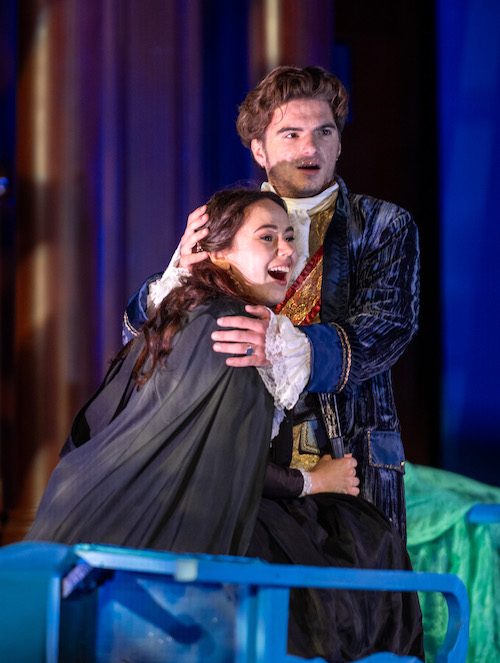Miami Beach Music Festival opens with enjoyable “Marriage of Figaro”

Eleanor Mayerfeld as Susanna and Adrian Melendrez as Figaro in Mozart’s The Marriage of Figaro, presented at the Miami Beach Music Festival. Photo: MBMF
A witty and inventive production of Mozart’s The Marriage of Figaro was the first operatic offering of this summer’s iteration of the Miami Beach Classical Music Festival.
Veteran opera director and pedagogue Nic Muni made a virtue of the limited performing space Saturday night at Temple Emanu-El. Conductor Steven Gathman brought sparkle to Mozart’s setting of Pierre Beaumarchais’ play about the volatile relationship between aristocrats and servants (with hints of the revolution that was aborning in 18th century France).
The female members of the cast clearly dominated the evening. As Susanna, the title character’s bride, Eleanor Mayerfeld was an authentic discovery. Mixing a charming, animated stage presence with an attractive soubrette voice, this young soprano is already a polished artist. She was delightful in duets with the Figaro of Adrian Melendez. In the garden scene of the final act, Meyerfeld’s free, clear top range and finely pointed phrasing made “Deh vieni non tardar” into a moment of sheer Mozartean magic.
Laura Fernandez was a regal Countess Almaviva. She registered the sorrow of the former Rosina (in The Barber of Seville) with a sizable soprano and richly colored middle register. Fernandez rendered “Porgi amor” and “Dove sono” in noble, classically idiomatic lines and she could produce a genuine pianissimo, even in the somewhat cavernous acoustics of the temple’s sanctuary. The weight of Fernandez’s sound and timbre nicely complemented Meyerfeld’s lightness in the letter duet.
Bethany Brewer brought a bright mezzo timbre and wide-eyed wonder to the amorous page Cherubino. There was youthful passion, as well as some well considered ornaments, in her performance of “Voi che sapete.”
With a pliant character mezzo, Spencer Bailen was a rough-hewn Marcellina, Figaro’s long-lost mother and Susanna’s opponent and eventual ally. Personable and pretty of voice, Abby Brodnick proved an engaging Barbarina, making one wish the role was larger.
As the arrogant and philandering Count Almaviva, Jiabo Gao emerged strongest among the male leads, displaying a firm baritone with power to spare. He projected anger and lust in the count’s second act aria and engendered a forceful dramatic persona, potently displaying the count’s cruelty toward Cherubino.
Making his initial entrance through the audience, Melendrez assayed Figaro as a dashing, quick-witted operator. His lightish baritone was stretched at the role’s high and low extremes and he was sometimes not audible but he blended well in the large-scale ensembles. Melendrez rose to a robustly sung ”Aprite un po’ occhi” in the final scene.
Although he had the low notes for “La vendetta,” Eduard Mararyan’s bass was unevenly produced, with choppy vocal lines. Dylan James Godbey’s agile character tenor and flair for rapid patter aided in establishing tBasilio’s devious nature. Young Il Jeon captured the vaudeville comedy of the gardener Antonio and Sasha Tomasevich made the judge Don Curzio an eager lackey of the count, his recitative deftly conveyed.
Aside from some brief horn slips in the overture, Gathman drew well-rehearsed, precise playing from the youthful orchestra. Despite the orchestra being placed on the far left side of the improvised stage, he managed to maintain balances with the singers. Holding the performance together impressively, Gathman kept the pace swift and bubbly. His more measured tempo for “Contessa perdona,” the count’s plea for forgiveness, seemed totally appropriate. Shih-Han Su handled the important continuo part in the recitatives with a deft touch and sensitivity to the singers’ vocal shaping.
Muni’s production astutely balanced the libretto’s class distinctions, romantic intrigue and comedy of manners. Utilizing minimal props and astutely tinted lighting that reflected the events’ time of day and night, Muni brought the action right into the audience’s lap. The sanctuary’s aisles and doors became part of the drama. Paulina Lozano’s period costumes contributed to the picturesque tableaux.
Despite some unevenness among the male roles, this was an astutely conceived production that would make a fine introduction to Mozart’s theatrical mastery for operatic newbies. There is one remaining free performance on Sunday afternoon.
The Miami Beach Classical Music Festival repeats The Marriage of Figaro 2 p.m. Sunday at Temple Emanu-El in Miami Beach. miamimusicfestival.com
Posted in Performances
Leave a Comment
Sun Jul 9, 2023
at 2:42 pm
No Comments